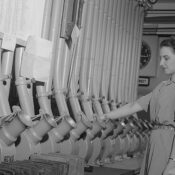
A 1999 television commercial encapsulated the telephone industry’s promise of the future along the information superhighway. A grizzled salesman drops his bag in the sparse lobby of Roy’s Motel.
“You got room service?”
“Doughnuts and coffee,” replies the receptionist.
“Got entertainment?”
“All rooms have every movie in every language, anytime, day or night.”
Astonished, the man asks, “How is that possible?” As his words die away in voice-over, the actor Willem Dafoe answers the question. “Could your business use the bandwidth to change everything? Ride the light. Qwest.”
Qwest was just one of the telephone companies that shaped the promise of connecting us to the World Wide Web. To fulfill this promise, telephone companies said they needed money to upgrade the copper wires that had been used since the first commercial telephone call was placed in 1878. The best new technology now was fiber-optic cables. While the biggest copper cables carried 4,000 conversations, AT&T said its fiber-optic cables could handle more than a million calls simultaneously. Experts on telephone economics calculated that this new technology meant the cost of calls would fall by 99 percent or more.
There was just one problem: Who was going to pay for the creation of the new network? The obvious source of revenue was customers, and, in the two decades from 1992 to 2012, Bruce Kushnick, a former telephone industry consultant, estimates that $360 billion moved from the pockets of customers to AT&T, Verizon, and the runt of the Baby Bell family, Qwest, which in 2010 was acquired by CenturyLink.
When you do the long division, Kushnick’s estimate works out to a toll of $3,300 paid by every household in America to access the superfast electronic highway. Although that cash was enough to speed the development of two national cell telephone systems, owned by AT&T and Verizon, the industry now cautions journalists that the term “information superhighway” is best not used anymore. That they want us to regard the term as archaic is not surprising, because its use is a reminder of their unfulfilled promise. The high-speed data lanes in most of America are among the slowest electronic highways in the world; in many places in the United States, the promised highway has yet to materialize at all and, under current policies, never will.
The United States invented the Internet, so it ranked number one when the first file was transferred between distant computers in 1969. Taxpayers financed that project through DARPA, the Defense Advanced Research Projects Agency of the Department of Defense. But by 2011, America’s Internet leadership was strictly historical. Today, South Korea has taken the lead in average Internet speeds. In 2011 its average download rate was 18 megabits per second. Romania came in second at 15 Mbps, Bulgaria was next at 13 Mbps with Lithuania and Latvia tied at 11 Mbps. America has settled well back in the pack—in 29th place. And thanks to government policies that foster the status quo and discourage real competition we’re likely to be stuck in the slow lane for a very long time.
Instead of increased competition between the telephone and cable companies, a new cartel emerged in the first decade of this century. While telephone and cable companies posed in public as rivals, Verizon made a deal to sell its branded services over cable company Comcast’s lines, and vice versa. And Verizon said it anticipates similar deals with other cable providers to sell over their systems. This cross-marketing deal between Verizon and Comcast reinforces the economic interests of telephone and cable companies by not extending lines to rural areas or poor neighborhoods and not wiring apartment buildings where few people could afford the new services.
Cable companies jacked up prices, too. Since 1995, average cable prices have been rising 2.6 times faster than the cost of living, reaching an average of almost $53 a month for basic, no-frills service in 2009, Federal Communications Commission reports show. The strongest evidence that the cable companies exert monopoly power to raise prices comes from a survey of prices for basic service plus the most commonly purchased extra features such as handheld remotes and premium channels like HBO. In 2008, the worst economic year since the Great Depression, when the national economy shrank and millions lost their jobs, cable prices rose.
In the 21st century, economic growth requires the ability to move huge volumes of information instantly. The Internet is to economic growth in the digital age what highways and airports were to economic growth in the 20th century. America prospered in its first two centuries because of massive public investments in the common modes of transportation that business needed to carry its goods. As it proceeds into its third century, the United States suffers from massive overcharging for poor-quality telecommunications services that carry its information.
The average broadband download speed in the United States is just 5 Mbps. That means that a large file someone in Seoul could download in one minute would require closer to four minutes in the United States. For an extra fee, American companies like Time Warner do offer some urban and suburban customers souped-up service with speeds up to 50 Mbps. However, the qualifier “up to” remains a big caveat. When lots of people use the same connection point, speeds can slow to 15 Mbps.
So while the United States falls behind almost 30 other nations in service, we do consistently rank at or near the top in one category: price. The average American consumer pays 60 percent more than a South Korean user. Americans who buy a triple-play package (cable television, Internet, and telephone bundled together) typically pay four times what the French pay. The French get live television from around the world, not just domestic shows. The French Internet is 10 times faster downloading and 20 times faster uploading than what most Americans can buy. For all this the French pay a total of 29.99 euros (about $40) per month.
Millions of Americans pay $160 or more for a triple-play package. Taking into account the much more expansive and faster services the French get, Americans pay six to 10 times as much for triple-play packages. But more important is that in this digital age American jobs, and how well they pay, will be determined in good part by whether America climbs back from 29th place in Internet speed or continues to slip further behind countries with lower wage scales and superior Internet.
The few places in America where local government leaders recognized this years ago are now prospering because they are attracting digital businesses. Places like Chattanooga, Tennessee; Glasgow, Kentucky; Lafayette, Louisianna; and Scottsboro, Alabama, that have built their own municipal systems are attracting new industries and enjoying savings at the same time. But instead of emulating such successes, the cable monopolists seek rules that let them force their captive customers onto the slow digital lanes while charging heavy tolls.
So what has happened to that promise so brilliantly packaged in the Qwest ad from Roy’s Motel? Instead of universal service, we are getting a retrenchment made possible by companies selling the public on one idea and then getting laws written that let them serve only those customers who can afford high prices. Worse yet, the system as constructed is so behind the times that, while highly profitable for the telecommunications monopolists, it retards the growth of the American economy. It operates outside the reach of market forces that could discipline the market and punish companies that abuse customers.
In short, our Internet-telephone-cable cartel has left us with the worst possible outcome. The promise captured in that Qwest commercial of universal, high-speed Internet access has proved to be nothing more than a mirage.
Reprinted by arrangement with Portfolio, Penguin Group (USA) Inc., from The Fine Print © 2012 by David Cay Johnston; Photo: Shutterstock
Become a Saturday Evening Post member and enjoy unlimited access. Subscribe now



